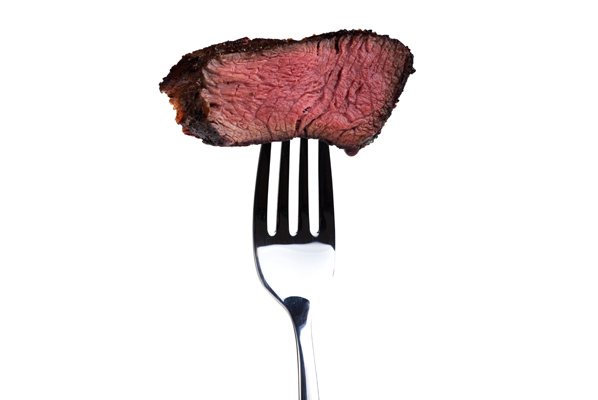You may soon be getting this surprising heart health advice from your doctor: “Eat two steaks and call me in the morning.”
Researchers at Kansas State University have come up with a way to add heart-healthy omega-3 fatty acids to beef.1,2
Omega-3s are powerful medicine against heart attacks. They are the active ingredient in fish oil pills, which many people take to prevent heart disease. Salmon and nuts have high concentrations of omega-3s.
Grass-fed beef naturally contains some omega-3s… About 20-30 mg per 5-ounce serving. But scientists have discovered a way to boost levels tenfold to 200 mg and higher.
They aren’t doing it with steroids. They didn’t do it in a lab. They simply feed cattle flaxseed and algae. Both are high in omega-3s.
Heart experts encourage a diet that contains about 500 mg of omega-3 fatty acids per day. So a beef dinner that contains 200 mgs versus 20-30 mgs provides a huge health boost.
Omega-3s help prevent dangerous erratic rhythms. Such arrhythmias cause most of the 500,000-plus cardiac deaths that occur each year in the United States. But that’s not all. Omega-3 fats also lower blood pressure, heart rate, triglycerides, and inflammation. They improve blood vessel function.3,4
The new heart-healthier beef is already sold in the Texas supermarket chain HEB. It sells a brand called GreatO. And the public, is, well, just eating it up! Sales of the omega-3 beef have risen 400% in just six months.
GreatO is ramping up production. It hopes to move into other markets in 2016.
The enriched beef is a little pricier than regular beef. But only by 15 to 20 cents per pound.
Ranchers hope the new algae and flaxseed feed will also increase the health of cattle. It may lead to fewer antibiotic treatments, which endanger humans by creating drug-resistant diseases.
What does it taste like? One restaurant owner says the omega-3 steaks have more marbling. They are more tender and flavorful than leaner grass-fed beef. His customers rave about it.
For years doctors told us that eating red meat upped our risk of heart attack. This was supposedly due to beef’s saturated fat and cholesterol content. That common “wisdom” has been debunked.
The American Heart Association and most other mainstream groups no longer advise restricting dietary cholesterol. They say it has little or no effect on blood cholesterol.
Beef can be an important part of the low-carb, high protein Paleo diet. INH recommends this eating plan for weight loss and general health.
Researchers stress that we should not forget red meats contain other vital nutrients. It’s high in iron, vitamin B12, and zinc.5
“Calorie for calorie, beef is one of the most nutrient-rich foods,” says Shalene McNeil, PhD, executive director of nutrition research for the National Cattlemen’s Beef Association. “One 3-ounce serving of lean beef contributes only 180 calories, but you get 10 essential nutrients.”
Eating omega-3 beef may become an easy way to boost your heart health in the near future. But there are also tests you can request at your next doctor’s visit to help you know if your heart is at risk.
But we’re not talking about blood pressure readings… About half of them are wrong.
Even the American Heart Association admits more than half of men who die of heart disease show no symptoms. But it’s not because the symptoms weren’t there… Doctors just couldn’t find them.
Discover the little-known test that detects heart disease quicker than the ones used in every doctor’s office across the country… And how a natural “warrior extract” can treat it without causing dangerous side effects.
Get all the details HERE.
In Good Health,

Angela Salerno
Publisher, INH Health Watch
Like this Article? Forward this article here or Share on Facebook.
References:
1http://www.foxnews.com/health/2015/10/12/research-beefing-up-steaks-hamburgers-with-health-omega-3s/
2http://www.mayoclinic.org/drugs-supplements/omega-3-fatty-acids-fish-oil-alpha-linolenic-acid/background/hrb-20059372
3https://www.pritikin.com/your-health/healthy-living/eating-right/1048-the-benefits-a-risks-of-eating-salmon.html
4http://www.hsph.harvard.edu/nutritionsource/omega-3-fats/
5http://www.webmd.com/food-recipes/the-truth-about-red-meat?page=2

